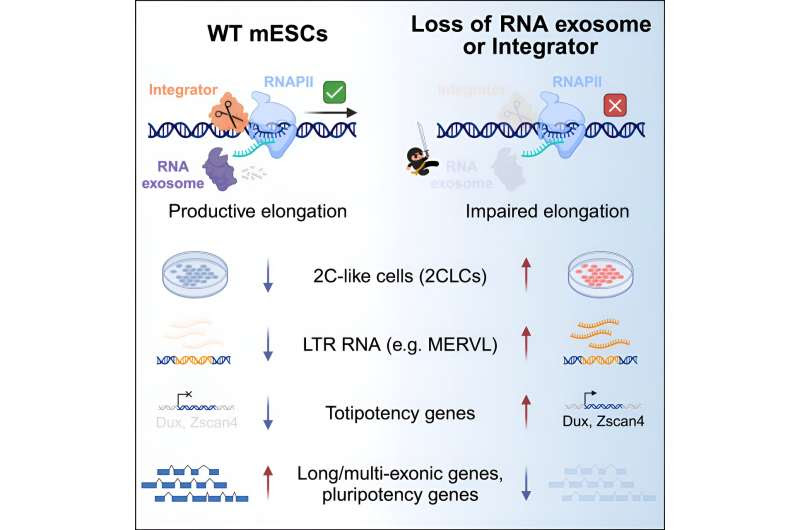by University of California, Irvine

Credit: Molecular Cell (2023). DOI: 10.1016/j.molcel.2023.10.036
Researchers at the University of California, Irvine, discovered a mechanism that controls the identity of stem cells. When this mechanism fails, embryonic stem cells revert back in time and become totipotent.
When a cell becomes totipotent, this rare change enables the cells to differentiate into hundreds of cell types, and then go on to form every part of our body. This contrasts with pluripotent stem cells, which can divide into various cell types but are unable to become an entire organism solely on their own.
The study, “Nuclear RNS catabolism controls endogenous retroviruses, gene expression asymmetry, and dedifferentiation,” was published Dec. 7, 2023, in Molecular Cell.
“In a dish of embryonic stem cells, the majority of stem cells are pluripotent. However, 1 out of 1,000 cells are different from the rest, and are totipotent,” said Ivan Marazzi, Ph.D., director of the at UCI School of Medicine.
“Totipotent cells are the only cells that have unlimited potential and can give rise to all parts of our body. We discovered the mechanism that allows this change from pluripotent to totipotent.”
The ability to change the identity of stem cells allows researchers to delve into the fundamental aspect of development, specifically what happens when two cells meet and give rise to an embryo. Moreover, many disorders like cancer and neurodegenerative disease are characterized by cells “going back in time,” a process called cellular dedifferentiation.
“Factors that control this ‘reversion’ from stem cell to totipotent cell are mutated in humans with cancer and neurodegenerative disease,” said Marazzi, professor in the Department of Biological Chemistry at UCI School of Medicine.” We think there is a special susceptibility of brain and cancer cells to be vulnerable to this mechanism, which could help us in the future as we treat patients with these conditions.”
More information: Denis Torre et al, Nuclear RNA catabolism controls endogenous retroviruses, gene expression asymmetry, and dedifferentiation, Molecular Cell (2023). DOI: 10.1016/j.molcel.2023.10.036
Journal information: Molecular Cell
Provided by University of California, Irvine

Leave a Reply